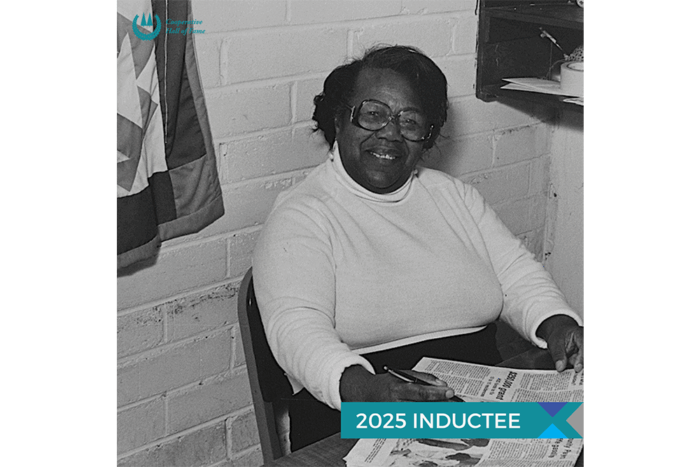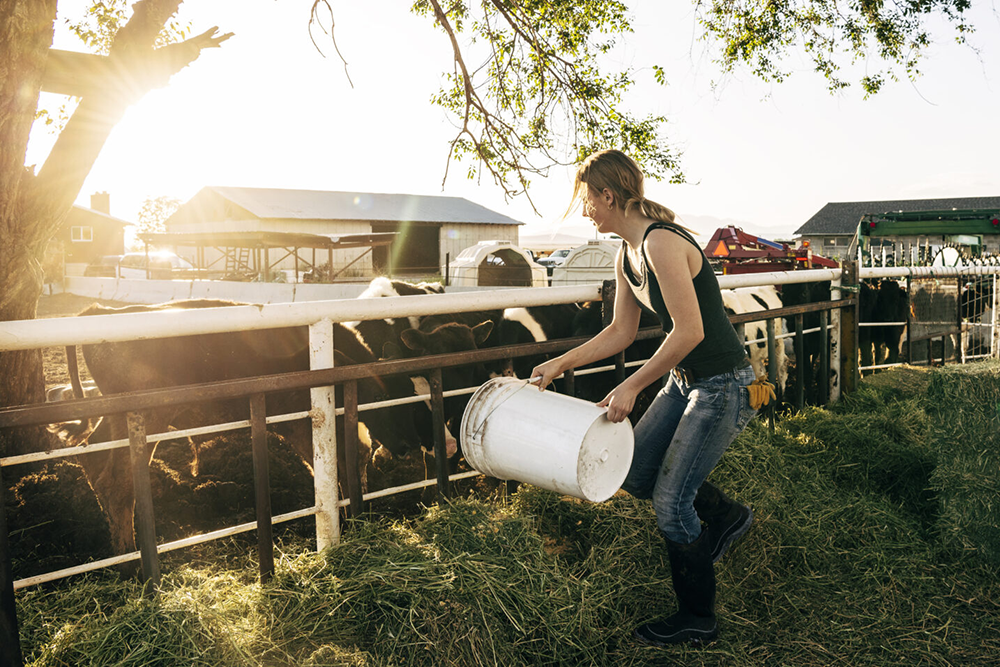
Estelle Witherspoon
Founding Member and Board President, Freedom Quilting Bee (in memorium)
Estelle Witherspoon is among four outstanding cooperative leaders who will receive the cooperative community’s most prestigious honor on October 9, 2025, when they are inducted into the Cooperative Hall of Fame at the National Press Club in Washington, DC.
Attend the induction dinner and ceremony as a sponsor
A Guiding Light
For over 25 years, Estelle Witherspoon was the “guiding light” of the Freedom Quilting Bee (FQB), a groundbreaking cooperative effort that became a source of much-needed family income as well as tangible community benefit and national artistic recognition of Black women sharecroppers and artists in rural Alabama. As a founding member and Board President of FQB, she oversaw marketing and sales until her retirement and helped transform economic reality for Black women artisans and their families in Wilcox County.
While the FQB dissolved in 2012 after their last original board member passed away, the influence of the cooperative and that of Mrs. Witherspoon continues.
Early Years
As a child, Estelle Witherspoon had a strong appetite for knowledge and seized every small opportunity to expand her education. Most Black parents in Wilcox County, like Mrs. Witherspoon’s, could not afford to send their children to high school. But Mrs. Witherspoon was undeterred and under the tutelage of a dedicated teacher was able to secure herself an education equivalent to twelfth grade or even early college.
She put her education to work when she took on the role of manager of the Freedom Quilting Bee (FQB). While Mrs. Witherspoon knew how to quilt, it was not her primary role. She applied her skills in communication, accounting and math to her management of FQB. Had a college education been available to her, she would have studied accounting. Her instinct to take what small privileges she had and return them manifold to the benefit of her community would consistently characterize her work with the cooperative movement throughout her career.
The Freedom Quilting Bee
Mrs. Witherspoon and her friend Francis Walter saw worker cooperatives as a vehicle for quilters that had the most potential to empower Black women in Wilcox County, which was then one of the poorest places in Alabama where many families remained trapped in the exploitative sharecropping economy. Thus, the Freedom Quilting Bee (FQB) was incorporated in April 1966 and Mrs. Witherspoon’s home served as its first address.
With a founding membership of around 60 quilters, the FQB brought together women from around the county under one cohesive organization. As FQB’s sales manager, Mrs. Witherspoon worked closely with galleries, businesspeople, buyers, Wall Street brokers, and leaders of other cooperatives to advance the cooperative. Her radical hospitality and ability to negotiate and collaborate with people from all walks of life would prove to be the driving force of the FQB for decades to come.
An Economic Engine
An economic heroine who never believed that something couldn’t be done, Mrs. Witherspoon facilitated and oversaw the Freedom Quilting Bee’s transition from a bespoke operation producing individual, one-of-a-kind quilts to a professional organization with a worker-owned sewing center employing over 100 people.
In order to increase profit and grow the cooperative, FQB partnered with a Wall Street investment bank and his wife. With their help, FQB transitioned to producing smaller items that would be produced more quickly and sold to department stores in larger quantities. This led to contracts with Sears and Roebuck and Bloomingdales. These contracts enabled the co-op to become the largest employer in their area of Wilcox County. The FQB’s financial success gave women who previously had no outlet to work outside the home the opportunity to become breadwinners for their families. Members of the FQB could now afford to send their children to school and improve their homes with modern appliances, granting them a level of economic freedom and self-determination that they have never experienced before.
Broader Community Benefit
The positive effects of Mrs. Witherspoon and the Freedom Quilting Bee were felt far beyond members’ households. The cooperative was able to establish a daycare center and after school and other youth programs that benefited all the children in their community. The FQB also owned land, a factory building, and equipment, all tangible assets that increased the economic independence of members and their families.
Ownership of land was especially important as many families lost the land they were sharecropping due to involvement with the civil rights movement. The FQB further facilitated Black land ownership by selling eight lots of land on their sewing plant plot to families who had been evicted from their homes.
Connecting with Other Cooperatives
A year after the founding of the Freedom Quilting Bee (FQB). Mrs. Witherspoon attended the first meeting of the Federation of Southern Cooperatives in 1967. She signed on behalf of FQB to become one of 22 charter members. Mrs. Witherspoon worked closely with the Alabama Cooperative Association, the regional arm of the Federation of Southern Cooperatives, to improve the FQB’s operations.
Additionally, Mrs. Witherspoon was also instrumental in cultivating a relationship between FQB and the Artisans Cooperative in Pennsylvania. This partnership allowed the FQB to gain access to the Pennsylvania and New England markets. With the help of the Artisans Cooperative, FQB was able to work on product development and market their crafts in the co-op’s nationwide catalogue. Those orders, along with the contract from Sears, allowed FQB to thrive.
Artistic Recognition
In 1998, an art collector came across a photograph of a dazzling quilt from old work clothes by one of the quilters of Gee’s Bend. His interest led to an exhibition that drew national attention and the launch of a nonprofit foundation to encourage the recognition and preservation of Gee’s Bend quilters. Quilts from this region now hang in over 30 prominent museums, including the Smithsonian, the Metropolitan Museum of Art, and the Tate Modern in London.
Lost in recognition and preservation was acknowledgement of the role the Freedom Quilting Bee played in bringing the work of the Gee’s Bend quilters to national attention, including securing contracts for smaller items that allowed the quilters to put food on their tables. While some of the FQB members’ work were featured in exhibits, little if any mention was made of the cooperative that spent decades promoting the work and artistry of generations of Southern Black women. Like Estelle Witherspoon, the Freedom Quilting Bee is also an unsung hero of the cooperative movement worthy of recognition.
Unparalleled Legacy
Estelle Witherspoon’s legacy goes beyond rectifying the economic injustice and deprivation of the communities she served. The Freedom Quilting Bee’s success helped achieve recognition and respect for the quilters’ artistry. Today, quilts hang in prestigious museums in the U.S. and abroad.
For understanding how the cooperative movement and the civil rights movement could mutually support one another and for using every gift she had been given to help uplift Black women in Wilcox County with dignity and self-determination, Mrs. Witherspoon will be honored with induction into the Cooperative Hall of Fame. Join us in Washington, DC on October 9 as we celebrate Mrs. Witherspoon and her contributions to the cooperative community.


